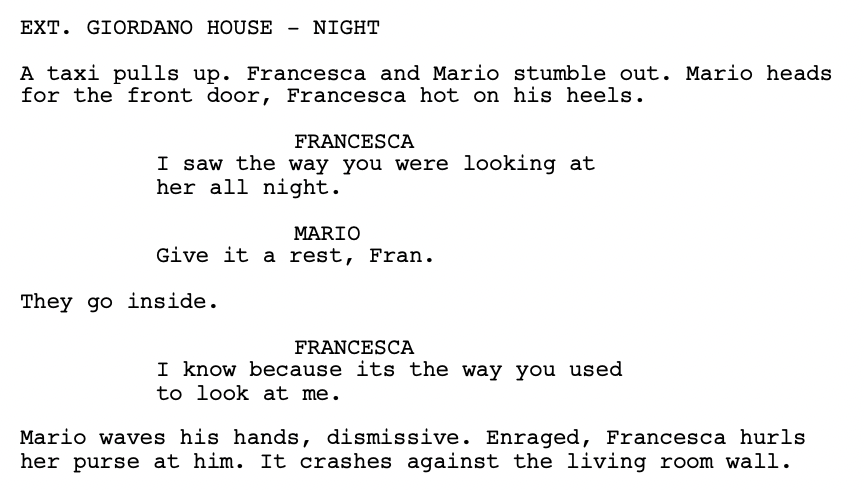Fix This - 12.22.24
If you're trying to sell a script to Hollywood or convince someone to give you money to make your movie yourself, you want to look like a professional. Avoiding mistakes and formatting errors goes a long way in making it seem like you know what you're doing.
Take a look at the excerpt below. Can you spot errors that need to be fixed?
If you’re trying to be economical with your words (never a bad idea in a screenplay), the first thing you can do is cut “the house” from “They go inside the house.” It’s obvious to the reader where they’re going and it’s repetitive information from the slugline. If Mario and Francesca take a detour and go inside a spaceship, you’d want to tell us that. Here, you can trim the line.
What else would you change?
The biggest problem with this excerpt is the missing slugline. When Mario and Francesca go inside, they’re in a new location. Even though they’re having the same conversation, it’s a new set up for the crew. That means, it needs its own scene heading.
You might sometimes see sluglines that say “INT. GIORDANO HOUSE - CONTINUOUS”. That means, the camera follows the couple inside the house without cutting. We recommend you use this sparingly and stick mainly to DAY or NIGHT at the end of your sluglines. (Among other reasons, it makes the A.D.’s job easier.)
We’ve added the missing scene heading, but we’ve introduced a new problem… a “Naked Slugline.” A Naked Slugline happens when you have a scene heading followed by dialogue. Every scene needs a bit of action at the beginning to set up what’s happening BEFORE characters speak.
Here’s one way this could look…
We’ve fixed the biggest problem, but there’s still more to improve!
If you read Francesca’s dialogue carefully, you’ll see there’s a common grammar mistake. Whoopsie! Your spell check won’t pick this up because “its” is a real word. Be sure you’re giving your script a thorough proofread. If you stink at grammar, ask someone to help you.
A couple errors to go…
The word “crashes” should be written as “CRASHES.” Why the all caps? Because it’s a sound effect. When that purse hits the wall, it’s going to make a noise. Any time something makes a noise, use all caps (The door CREAKS. The birds CHIRP. The machine WHIRRS… You get the idea.)
One more little adjustment to go!
Remember earlier when we cut “the house” because it was repetitive and obvious from the slugline? Now that we’ve added the scene heading to this scene, we can do the same thing to the last line. There’s no reason to say “living room wall” because we know from the slugline that the characters are in the living room. If the purse hits Little Vinny’s bedroom wall and the baby starts to cry, that’s worth making clear. Here, we assume it hits the living room wall. No need to include unnecessary / repetitive information.
Whew! That’s a lot of changes in a short excerpt!
If you want help getting your script in tip-top shape, send it to us for professional script notes. In addition to suggestions for how to improve your writing, we’ll do a deep dive on your story, characters, structure, scenes, and dialogue.
As one client said, “The Script Notes I received from KTS on my feature script were more comprehensive than I ever expected. I don’t think there is another service out there that can compete with the value they bring... I got so many great ideas and feedback from KTS that it felt like they were in my corner, like they were a producing partner that was invested in my project. I will use KTS on every script I write in the future, they are invaluable!” (Thanks, Luke!)







